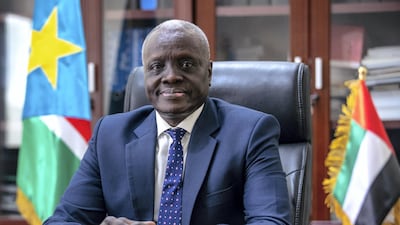Political stability and peace are crucial for the world's youngest country after years of struggle to build up state institutions and end tribal violence, South Sudan’s ambassador in Abu Dhabi said.
In an interview with The National, Deng Deng Nhial said corruption was also one of the biggest obstacles to the development of a country rich in natural resources, which should be spent properly on infrastructure and basic services.
Mr Nhial, in office since 2016, said his country regarded the UAE as a role model for economic and technological success.
“The UAE’s achievements in infrastructure, basic services, trade, tourism and technology are top-notch," Mr Nhial said.
"We will learn a lot from the UAE and build on the agreements President Salva Kiir Mayardit signed during his visit to Abu Dhabi in 2019.”
On that visit, Mr Kiir signed deals on investment, avoiding double taxation and visa waivers for UAE citizens.
After two decades of war, South Sudan gained its independence from Sudan on July 9, 2011, after a landslide referendum result.
But peace was short-lived.
Since then, South Sudan has been torn apart by a civil war which began in 2013 after Mr Kiir sacked vice president Riek Machar.
The men belong to the influential Dinka and Nuer ethnic tribes, respectively.
They signed a peace accord in 2018 and formed a government of national unity in February 2020, ending a war that is estimated to have killed more than 400,000 people.
The conflict uprooted a quarter of South Sudan’s population of 12 million people, ruined its agriculture and battered the oil-based economy.
Despite the peace deal, the UN says violence is still raging in parts of the country.
“Political stability is first and foremost," Mr Nhial said. "We have relative peace now.
"As stipulated in the 2018 agreement we have to establish state parliaments and governments, cantonments for a big unified army.
"This is a vast country that has 64 tribes."
Obstacles to economic growth
Mr Nhial, who was born during a civil war in 1961, said three things were needed to attract foreign investors to a stable South Sudan and gain their trust.
“We need to have a good infrastructure, good education and a digital economy to fight corruption," he said.
"We have a 2030 vision that will see free-trade zones, a new capital city in Ramciel, which means let’s meet in the middle thanks to its strategic, central position and the nature of its flat land."
The dilapidated infrastructure, mainly as a result of decades of war, has been identified as the biggest hindrance to economic growth in the land-locked country.
South Sudan will need more than $10 billion to build and upgrade about 10,000 kilometres of roads, the Ministry of Transport said.
The African Development Bank estimates there are about 35 metres of paved road for every 1,000 residents, compared with an average of 128 metres in cities in the Sub-Sahara region and 700 metres in the low-income countries of the developing world.
Mr Nhial said that effective management and development of the country’s vast resources was vital to achieve sustained growth as the economy has been badly hit by war, hyperinflation and Covid-19.
He said South Sudan wanted to diversify its revenue by adopting a mechanised agriculture economy, because most of the population depended on farming for their livelihood.
“We can grow any plant in South Sudan as 96 per cent of the land is arable, we have the mineral resources and the water," Mr Nhial said.
"We have the oil and 22 minerals, including gold. Mining is big in South Sudan.
“We also have an impressive wildlife of 13 reserves and eight national parks, which will become a key national income revenue from tourism.
"We will build hotels, golf courses and restaurants. We are very ambitious.”
Oil revenue from the production of about 500,000 barrels a day account for 98 per cent of state revenue.
Since independence, Juba has contracted oil sales worth $2.14bn, the latest statistics last year by the International Monetary Fund show.
The local currency has plunged since the outbreak of the 2013 civil war.
The South Sudanese pound has depreciated to 176 to the US dollar, compared with 2.92 to eight years ago.
The severe depreciation increased inflation to an estimated 31.1 per cent in 2020.










